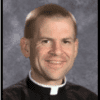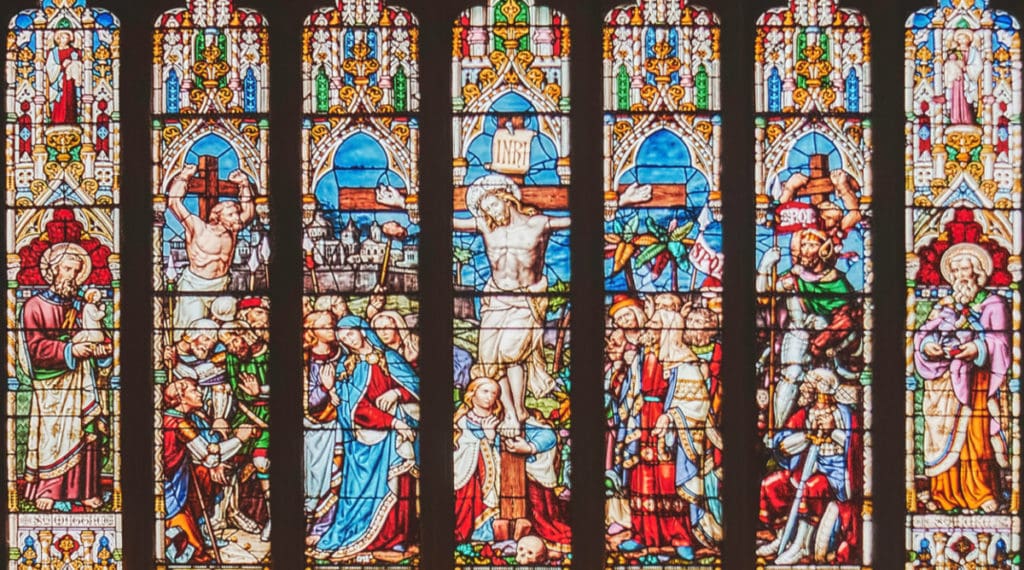We are in the midst of Paschal Triduum–the holiest three days of the year. We remember the dramatic story in which Jesus redeemed and renewed us.
“Paschal” is another word for Passover. That connection is lost when we use the common English word “Easter.” On Resurrection Sunday, my Spanish-speaking parishioners will say to me, “¡Feliz Pascua!” which literally means “Happy Passover!”
For us Christians, the Passover observance has been forever changed by Jesus. No longer do we spread the blood of a slaughtered lamb on the doorposts and lintels of our homes. Jesus offers himself as the lamb of God who takes away the sins of the world. He willingly becomes the lamb, once slain, who now lives, never to die again. His dying and rising are one single offering to the Father. They are now, for us, one single celebration.
In terms of calendar time, the Triduum spans three days, beginning the evening of Holy Thursday and concluding the evening of Resurrection Sunday. However, it remains one single event, a seamless moment in time.
Scripture scholars distinguish chronos and kairos, two Greek words for “time.” Chronological time marches along with steady precision, and with utter disregard for our lived human experience. Sometimes time can’t move quickly enough, as on a Friday afternoon when students and employees stare at the sluggish clock. At other times the hours, weeks, or even years seem to be racing past us. By contrast, there are kairos moments within the passage of time. Whether such a moment lasts a few hours or a few months, we remember it as one significant event or era.
The Sacred Triduum is THE kairos event of human history.
For many of the disciples, it was largely a trauma event. They abruptly lost their Lord and found themselves falling away from him. Within moments, they experienced dread, doubt, confusion, betrayal, loss, guilt, and shame. Trauma has its own sense of timelessness. When we feel powerless, it seems like the anguish will never end.
Jesus transforms our human experience. He willingly enters the depths of human drama and human trauma, conquering every single moment with perfect love.
For some of you, “Triduum” is a new word and a new concept. Others among you have been observing it liturgically for decades. Either way, I invite you to gaze and ponder afresh what transpired during those three days. This three-day event is willed by God to become the very heart of every human story.
DAY ONE
Remember that in Jewish tradition, the new day begins at sunset. Therefore, Day One of the Triduum includes Jesus’ suffering, death, and burial. He initiates this new Passover event by sharing a meal with his disciples. They spend much of the meal debating who among them is the greatest. He declares the bread and wine to be his own flesh and blood and commands them to commemorate this offering. He prays to his Father in the garden. He watches his friends abandon him as he faces arrest, trial, torture, mocking, and crucifixion. His physical torment alone is enough to move human hearts to repentance. But his emotional and spiritual suffering were so much more intense. He willingly takes on our own infirmities, freely entering every traumatizing human experience: abandonment, rejection, the violation of his body, shaming comments, and a felt powerlessness. His cry to his Father gives voice to every human heart that ever has or ever will endure such experiences: “My God, my God, why have you abandoned me?” But unlike each of us, Jesus remains faithful and true. He surrenders in trust; he holds out hope; he loves to the end. Day One concludes with his burial and the sealing of the tomb, just in time for the Sabbath.
DAY TWO
Day Two is so easily forgotten by Christians. Jesus’ body remains in the tomb on a Sabbath Day like no other.
Imagine what Holy Saturday was like for the various followers of Jesus. Many had abandoned him or denied him. Imagine the shame they felt! The gospels don’t specify what Peter and the others were up to on this day, but we know that by Sunday most of them were on voluntary lockdown, cowering in the cenacle.
Most of them had their messianic hopes crushed. Despite Jesus’ miracles, parables, and constant proclamation of the Kingdom of God, each follower continued to clutch a more tangible kind of salvation – deliverance from the Romans or restoring the Kingdom of Israel.
Others, like Mary Magdalene, were actively seeking him, like the beloved in the Song of Songs, going out into the night and earnestly searching after the one her heart loves. Desiring and not possessing is an agony like no other – the agony of Hope.
There is also the Hope of Mary, Jesus’ own mother, who had spent thirty years with him, had stood with him at the foot of the Cross, and had always pondered his words and events in her heart. She knew his promises better than anyone. As at the Annunciation, as at Bethlehem, as during the flight into Egypt, as when seeking and finding Jesus in the Temple, Mary believed that God was ushering in a new and greater human experience. But she couldn’t imagine what it was going to be like. She persevered in Hope. Scripture doesn’t tell us about what it was like when Mary encountered the Risen Jesus, following the agonizing Hope of Day Two. But we can imagine the surprise and the joy.
In Catholic life, each Saturday is a day of devotional remembrance of Mary. We forget that it is her day because Holy Saturday is the day on which she persevered in Hope.
DAY THREE
Jesus rises on the Third Day, during the night preceding the dawn of Resurrection Sunday. No other human being directly witnesses his Resurrection, but the encounters explode, like kernels of corn beginning to pop – at first one by one, and then rapid fire. In every encounter, the Risen Jesus catches them by surprise and fills their hearts with unimaginable joy. Their narrow and preconceived ideas about the messiah are shattered against the event of his dying and rising. He helps them to understand how everything in the Law and Prophets – indeed everything about our human story – points to this new Passover. This event of his dying and rising (and the agonizing wait in between) is what gives meaning and purpose to your story and mine.
Even still, you and I have a tendency to bypass the Paschal Mystery. Resurrection sounds nice, but what about fully entering with Jesus into suffering, dying, and an agonizing wait at the tomb? Like the characters in the Bible, we prefer perfectionistic rule-following, secular political solutions, or the old standbys of pleasure, prestige, and power.
This Holy Week, may we allow our minds and hearts to be reawakened to the Faith, Hope, and Love that the Sacred Triduum offers us.
This post was originally published on Abiding in Truth and Love and is reprinted here with permission.
Photo by K. Mitch Hodge on Unsplash




